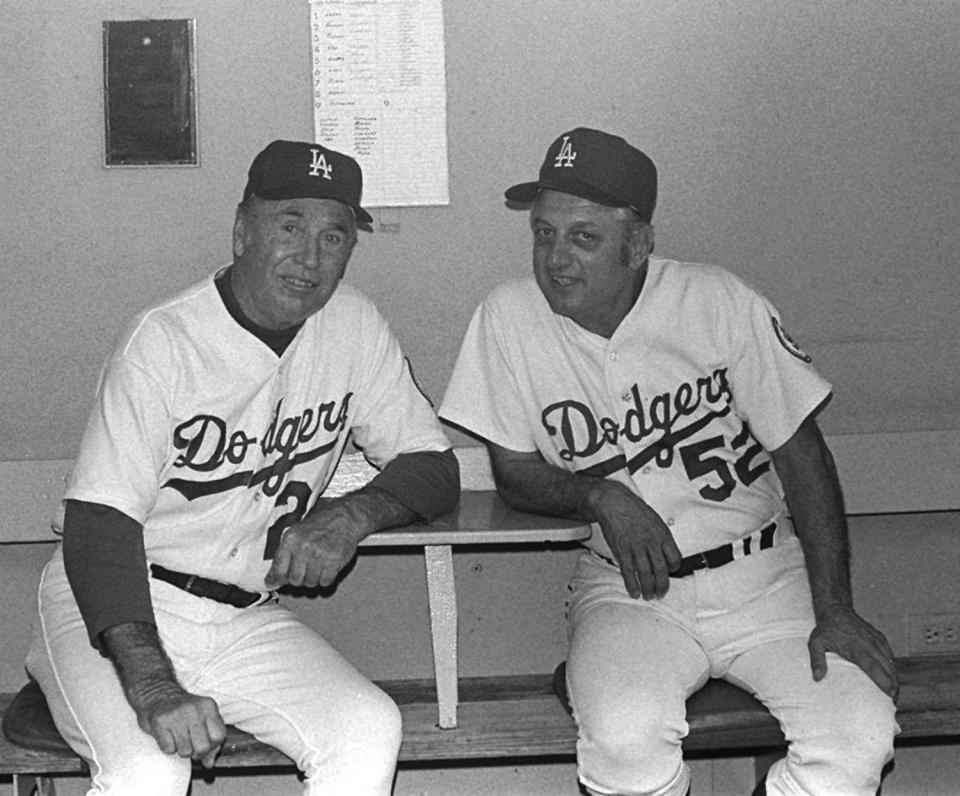Peter O'Malley on why Tommy Lasorda and the Dodgers were a perfect pair
- Oops!Something went wrong.Please try again later.

The Tommy Lasorda era could have started one year earlier. After the 1975 season, the Dodgers were prepared to replace Walter Alston, who had managed stars from Jackie Robinson and Roy Campanella to Steve Garvey and Don Sutton.
“I was ready to make that change, with my dad’s support,” Peter O’Malley, then the Dodgers’ president and son of owner Walter O’Malley, told The Times Friday, after the team announced Lasorda had died at age 93.
Alston asked to manage one final season, and O’Malley agreed. Lasorda remained a Dodgers coach, and the Montreal Expos offered him their managerial job. As O’Malley recalled the story Friday, Expos owner Charles Bronfman had warned team president John McHale that Lasorda’s loyalty rested with the Dodgers.
“He’d be great here in Montreal,” Bronfman told McHale. “[But] he’s not going to leave.”
With four games left in the 1976 season, Alston announced his retirement, with Lasorda the new Dodgers manager. Although O’Malley said he had not promised Lasorda he would succeed Alston, he said the choice was clear, even though the Dodgers were a perennial contender and Lasorda never had managed in the major leagues.
“Tommy was the obvious choice,” O’Malley said. “He had all the ingredients. He was a people person. He communicated so well with everyone. He knew the game. He played the game. He knew the young players coming up. He knew the veteran players.”
He knew Cooperstown too, as it turned out. After Alston managed the Dodgers for 23 years and earned a spot in the Hall of Fame, Lasorda managed the team for the next 20 and also earned a spot in the Hall of Fame.

From 1954 to 1996, the Dodgers had two managers and six World Series championships.
Just as Alston had, Lasorda retired before the end of his final season, but Lasorda was reluctant to do so. He had suffered a heart attack. O’Malley told him his health was more important than his job and urged him to retire.
“He didn’t want to do it,” O’Malley said. “He didn’t want to take the uniform off.”
The next day, O’Malley said, he met with Lasorda and his wife, Jo.
“It was Jo who helped Tommy realize that Tommy would be better off, and that he would be fine taking that uniform off,” O’Malley said, then paused for a chuckle. “Of course, he never took that uniform off.”
Indeed, Lasorda's retirement opened the door to what O’Malley called “the next chapter of his life,” as his identity morphed from Dodgers manager to baseball ambassador. He managed the United States Olympic team to a gold medal in 2000, and he traveled across the country and around the world to promote the game he loved.
“It was a second career,” O’Malley said.
O’Malley said he appreciated Lasorda’s passion in all that he did.
“He was all in,” O’Malley said. “He never signed autographs, or talked to a group, or supported his players, or talked to fans, even the media, with less than 100%. He was committed — to baseball, to the organization, in everything he did.”
Lasorda might have been most at home at Dodgertown, the team’s old spring home in Vero Beach, Fla. The facility, sculpted from a former military base, was not so much a training site as it was a community. Players and coaches lived on site, walking or riding golf carts from their personal rooms to clubhouses, baseball fields, dining rooms, lounges and golf courses.
“Tommy would see everybody, and everybody would see Tommy — all of us, whether it was team doctor or an umpire or a press person, whatever,” O’Malley said.
“Dodgertown was really made for Tommy, and Tommy was made for Dodgertown.”
Lasorda spent the springs of his adult life playing, coaching and managing at Dodgertown. In 2008, a dozen years after he retired as manager, the Dodgers afforded him the honor of managing the last game they would play there, one year before they would move their spring home to Arizona.
The game ended. The Dodgers players formed two lines on the field, holding crossed bats aloft. Lasorda teared up as he walked through beneath the bats. His Dodgertown was history.
This story originally appeared in Los Angeles Times.

